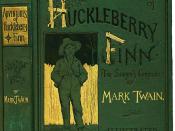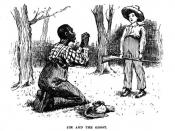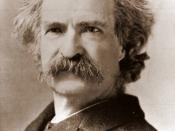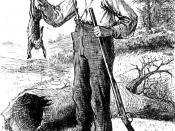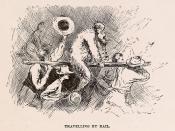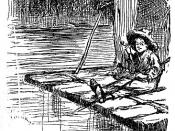Samuel Clemens, better known as Mark Twain, one of the greatest writers in American literature, published Huckleberry Finn in 1885. Written as a sequel to Tom Sawyer, it was set during Antebellum when slavery was at its peak. Huckleberry Finn should not be removed from classrooms because it deprives students of knowing what racism is, especially the prejudice towards the African Americans. The students should also understand the immorality entailed therein, and learning true history of the South. Thus in a world full of corrupting influences, banning The Adventures of Huckleberry Finn will only deprive students of an educational and thoughtful piece of literature.
Without Huckleberry Finn, students will not have a sense of reality of racism and its history in America. Its removal; will prevent students form develoing a sense of discrimination, reading this book will help them understand racism and how it still exist today. Huckleberry Finn shows all the characteristics of a discriminating book, the way African Americans were thought as, such as the father of Huck Finn thought: "Thinks I, what is the country a-coming to? It was 'lection day, and I was about to go and vote myself if I warnt too drunk to get there; but when they told me there was a state in this country where they'd let that nigger vote, I drawed out.
I says I'll never vote again." -( MarkTwain, pg 35) Huck Finn also shows prejudice to Jim while they debate on the issue of Solomon and says "I see it warn't no use in wasting words-you can't learn a nigger to argue."-(Mark Twain, pg. 84) The word "nigger" is one of the ways Mark Twain uses to fully utilize this novel into a realistic fictional piece that describes the old hatred of US history; not part of the romanticism works written by most authors such as Margaret Mitchell, who wrote Gone With the Wind. Having this kind of material exposed in classrooms will enable the students understand African Americans were considered inferior because they were thought to be beasts and does not have the capacity to do nothing else than to become enslaved and to work for the white people. The kind of life that the slaves and or free African Americans endured that is very important in history of the US, because it helps us learn from our mistakes by avoiding the ones that were made in the past.
The immorality in this novel is typical of everyday lives of people who were not among the aristocracy that exists in the south. Human behavior that is depicted by Mark Twain ties into the how society works and a fundamental theme that tells the truth of human society. He illustrates that although Huck thinks African Americans are inferior, he tears up a letter sending Jim to slavery and declares, "All right, then, 'I'll go to hell.'" This shows that Huck doesn't put his morrows on what was accepted during those times, but he still believes in them. Mark Twain uses Huck "comes to terms with is that life's questions should be answered with the heart," (anonymous, online). The nature of Huck's father can be related to today's intoxicated individuals who are normally addicted to the alcohol and are infamous for beating their female partners or their children. Another type of human behavior that the reader can recognize is the fraudulent and double-crossing people who prey on other gullible innocent people is presented as the King and the Duke. Allowing students to read the novel and distinguish these human behaviors will realize that things never change, such as how society interacts with one another.
Huckleberry Finn contains abundant source of U.S. history in which accurately illustrates lives of the white people and the African Americans. Being discriminated by the color of the skin was typical, and even free African Americans who lived in the North were prejudiced. However, they being slaves, made the South's economy; it was them who "'With massive brawn and indefatigable endurance they wrought under burning suns and chilling blasts, in swamps and marshes-they cleared the forests, tunneled mountains, threaded the land with railroads, planted, picked, and ginned the cotton, produced the rice and the sugar for the markets of the world. Without money and without price they poured hearts' blood into the enriching and developing of this country.'" -(Anna J. Cooper, pgs. 64-65) It was normal for slaves like Jim to escape their owners and go North where slavery doesn't exists. This part of history Mark Twain covers is significant because it is leading to the Civil War in the U.S. Students should be able to read this novel because it will help understand the main reason of the Civil War: slavery.
People trying to ban this novel do not realize the significance of this piece of literature. They do not see beyond the racism and the immorality and truly understand why Twain choose to write about what was real verses the romanticizing stories on the South. Banning Huckleberry Finn will deny future generations of learning about America's past, especially on the issues of slavery and racism. "We Americans, and particularly African Americans, need to find a clearer understanding of who we were, as wonderful and as painful as out history is, so that we can more successful determine what we wish to become."-(Jocelyn Chadwick-Joshua, pg xiv" Works Cited Textual 1. Mark Twain. Huckleberry Finn. New York Signet Classic, 1997.
2. Jocelyn Chadwick-Joshua. The Jim Dilemma. Jackson University Press of Mississippi, 1998.
3. Louis J. Budd. New Essays on Huckleberry Finn. Cambridge. Cambridge University Press, 1998 4. Lane, Lauriat Jr. "Why Huckleberry Finn is a Great World Novel" Mark Twain's Huckleberry Finn October, 1995:pgs 95-100.
Websites http://www.saunalahti.fi/frog1/papers/huckfinn.htm http://www.chuckiii.com/Reports/English/huck_finn_critical_essay.shtml
